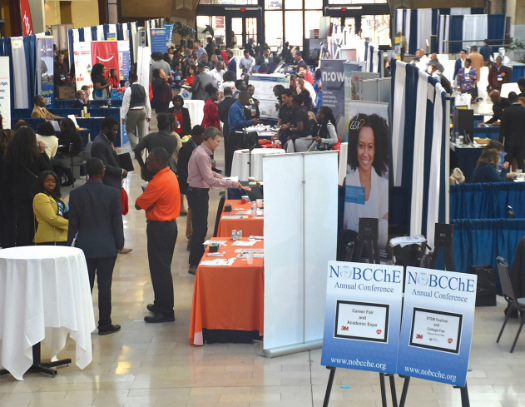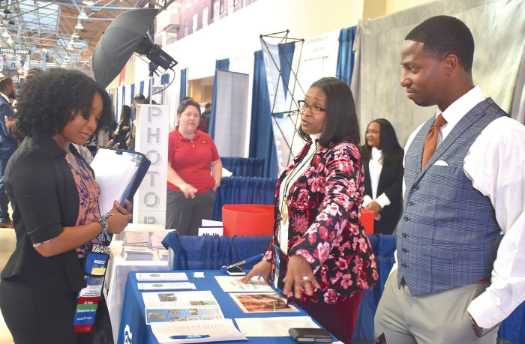Black chemists and chemical engineers convene in St. Louis
By J.A. Salaam -Contributing Writer- | Last updated: Dec 2, 2019 - 12:11:06 PMWhat's your opinion on this article?
ST. LOUIS — The National Organization for the Professional Advancement of Black Chemists and Chemical Engineers (NOBCChE) met in St. Louis recently for their annual meeting. There were over 500 of the most brilliant minds in the field STEM (Science, Technology, Engineering and Mathematics) gathered from across America, Canada and the Caribbean at St. Louis Union Station for five days of networking, workshops, presentations and job opportunities.

Black chemists and chemical engineers gathered recently for networking, presentations and job opportunities.
|
Many of the participants expressed high enthusiasm and praises for the great work of the 47-year-old organization. The group was founded in 1972 and has held true to their mission to build an highly skilled cadre of people of color in science and technology. The exhibit hall was packed with attendees sharing their years of research and discoveries of what could be the next shift in STEM. There were workshops and breakout sessions each day during the Nov. 17-21 gathering from morning till evening. Former organization presidents, founding members, past and present board members also attended the conference.
Ashley Johnson, a student at the University of Southern Mississippi majoring in organic chemistry, shared her heartfelt thoughts about the conference. “I read about NOBCChE a few times and I’m about to graduate so I wanted to attend and present my research. Having been to other similar symposiums, I think this is the greatest display of participants who’ve been where we are and they want to put us out into the marketplace,” she explained.
“Oftentimes at other conferences the companies are there trying to sell their products. But here they are actually interested in recruiting you and I think that is amazing,” she added. “They show you how to get started and give you the necessary tools and whatever workshops you need. Lots of students don’t get that from their advisors so it’s amazing to be able to come here and have people who are willing to help you to go above and beyond to make sure that you succeed,” said Ms. Johnson.
Throughout history Black people have contributed as great builders and inventors, but in some cases those contributions have been claimed or outright highjacked by others. Lewis Howard Latimer was a Black inventor and patent draftsman for the lightbulb and telephone, not Benjamin Franklin or Thomas Edison. Otis Frank Boykin was an inventor and engineer. Mr. Boykin patented 28 electronic devices. One of his notable inventions included a variable resistor used in guided missiles. His most famous invention was a control unit for the artificial cardiac pacemaker.
Dr. Victor McCrary is former president of the National Organization for the Professional Advancement of Black Chemists and Chemical Engineers. He is a National Science Board member, and vice-president for research at the University of the District of Columbia. Dr. McCrary was one of many speakers at this year’s conference. He outlined hard facts about the need for organizations like the National Organization for the Professional Advancement of Black Chemists and Chemical Engineers to be an active source for those who are aspiring to become experts in their field.
“It’s 2019 and there are still opportunities for students of color in science and technology. Right now, our national statistics show that only about four percent of Blacks are participating in science and engineering disciplines as opposed to our population of about 12-14 percent. So, there’s room to grow,” said Dr. McCrary.
“Conferences like NOBCChE expose particularly college students, to go to graduate school for opportunities in industry as well as understanding the skills it takes to be a scientist to go on into a career in research,” he added. Conferences like these are a place students can see people who are successful educators, leaders and business people in their STEM fields.
“That’s the value in conferences like NOBCChE as well as other minority technical organizations like the National Society of Black Engineers and the Society of Hispanic Professional Engineers, SACNAS (Society for Advancement of Chicanos/Hispanics and Native Americans in Science),” explained Dr. McCrary.
“We have these conferences to help underrepresented groups find a voice and be seen in the STEM field. This is important because when people see others who look like them they are more willing to feel comfortable in what they do, especially me, because I’m from a PWI (Primarily White Institution) and I have never had a Black professor,” said Marie Bozor, of Florida Gulf Coast University.
“To be able to come here and see other Black chemists and professionals, it solidifies my position in this field,” said Ms. Bozor.

The National Organization for the Professional Advancement of Black Chemists and Chemical Engineers was founded in 1972. The group held its annual conference in St. Louis.
|
Dr. Robert L. Shepard is a longtime member of the National Organization for the Professional Advancement of Black Chemists and Chemical Engineers and an advocate for engineering faculty and staff at Historically Black Colleges and Universities. In his workshop Dr. Shepard spoke about the importance of each person first identifying who they are individually before they can become part of a larger group or institution. His message of self-empowerment and self-discovery was well received by those in attendance. Dr. Shepard gave several hand-outs to workshop participants and encouraged them to research and study the information, to better understand how important, the mission of the National Organization for the Professional Advancement of Black Chemists and Chemical Engineers is in relationship to HBCUs and their students. One document showed the disparity in funding between predominately White campuses compared to Black ones.
According to the 2019 March issue of the National Center for Science and Engineering Statistics, federal science and engineering obligations to academic institutions increased by two percent. But support to HBCUs declined 17 percent. The report stated that in fiscal year 2017 federal agencies earmarked $32.4 billion to institutions of higher education in support of science and engineering up two percent from $31.6 billion from the previous year. Funding for research and development to universities and colleges increased four percent to $29.8 billion. However, the support for HBCUs has declined three years in a row to $308 million. These are staggering numbers and as Dr. Shepard said, “HBCUs in America have never been afforded enough help, especially financial resources and continue to operate with too little.”
Dr. William M. Jackson, Jr., research and professor emeritus of chemistry at the University of California, Davis and an original founder of National Organization for the Professional Advancement of Black Chemists and Chemical Engineers, said during the early days of the organization some industries were really active in becoming more inclusive. Black chemists, chemical engineers and scientists in those companies would support the professional organization by giving scholarships, fellowships and participating in the exhibits.
“I’ve been a member of NOBCChE since 2008, and it is a beacon of diversity and dedication to the scientific enterprise. Because of that it fulfills a vital function that corresponds to the national need and to a cultural imperative. This country has a great richness of talent and experience. But it also has a need to continue progressing in science and technology, especially in the chemical science,” said Dr. J.V Ortiz, a former board member.
Dr. Murrell Godfrey is the current president and has been with the organization since 1999 and founded the local chapter at the University of Mississippi. Dr. Godfrey spoke candidly about the role the organization plays in the lives of future STEM students.
“There is a need for what we’re doing for more representation. There is a need for us to show our faces where up and coming potential Black chemists and engineers see what we are doing and (show) that they can achieve what we have achieved. That is why we do need to do more,” said Dr. Godfrey.
“We do know that there are a lot of obstacles out there but through other organizations such as ours in collaboration with other programs such as ACS (American Chemical Society), we can overcome a lot of those hurdles,” he said. “People that are here, businesses, industry, government agencies that are here and show the up and coming scientists, chemists and engineers that there are people out here that care and that there is always hope. Just continue to strive and to put in the time. Networking is very important and also believe in yourself and know that you can do it,” added Dr. Godfrey.
Since 1974 the group has had 12 presidents, eight men and four women. Marquita M. Qualls, Ph.D., one of the former presidents shared a historical perspective of the value of the organization.
“This is an organization that has historically been able to have at least three generations of mentoring going on at one time. When you come to a NOBCChE conference, you’ll have high school students who are participating in the Science Goals Science Fair, college and graduate students who are participating and really learning how to be a professional and starting their career in the sciences. Then you have the professionals, those who have infiltrated into those processes and are able to give back and mentor their students,” she said.
“From the professional perspective, this organization was founded to help other professionals and to be a network when there was not a network for us to be a part of in the larger organizations of the larger professional societies. NOBCChE has also grown from that perspective and being able to be a force, to be a network and a resource for people of color or a scientist of color to have a home where when no one else would celebrate you, we can celebrate ourselves,” said Dr. Qualls.
Safiyah Muhammad, a member of the Nation of Islam attends the University of Illinois at Urbana Champaign. She is a chemistry major and working toward her Ph.D. Ms. Muhammad travels every year to the conference because to her it’s like family.
“I love this conference, because it really is a community. You come back every year and you see the same faces and you see people progress through their degree and you also get to meet new and upcoming people and inspire them,” she said.
“It’s great to see so many Black people in these fields and to know that there’s really greatness among us and that we’re doing big things. Even though we’re so spread out, it’s kind of like a family reunion,” she said. For more information on NOBCChE, visit www.NOBCChE.org.
INSIDE STORIES AND REVIEWS
-
-
About Harriett ... and the Negro Hollywood Road Show
By Rabiah Muhammad, Guest Columnist » Full Story -
Skepticism greets Jay-Z, NFL talk of inspiring change
By Bryan 18X Crawford and Richard B. Muhammad The Final Call Newspaper @TheFinalCall » Full Story -
The painful problem of Black girls and suicide
By Charlene Muhammad -National Correspondent- » Full Story -
Exploitation of Innocence - Report: Perceptions, policies hurting Black girls
By Charlene Muhammad -National Correspondent- » Full Story -
Big Ballin: Big ideas fuel a father’s Big Baller Brand and brash business sense
By Bryan Crawford -Contributing Writer- » Full Story






 Click Here Stay Connected!
Click Here Stay Connected!








